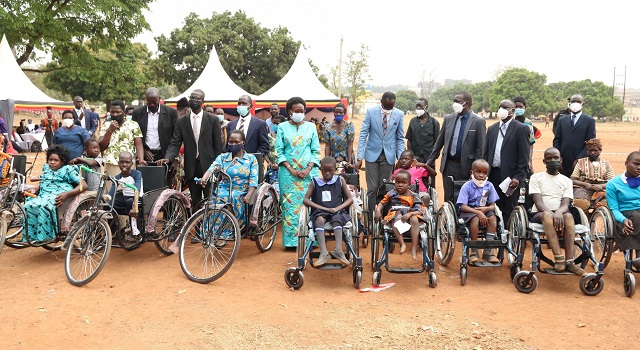
Lira, Uganda | THE INDEPENDENT | The Ministry of Health has launched a nationwide program to donate wheelchairs and other assistive devices for Persons with Disabilities (PWDs). The drive started in Lira district on Thursday.
During the launch, 50 Persons with Disabilities were given wheelchairs, while others received tricycles and crutches among other items procured with support from the Church of Jesus Christ of the Latter-Day Saints. Lira district and the city combined, have a total of 6,707 PWDs, most of them victims of Poliovirus.
Health Minister Dr Jane Ruth Aceng explained that access to assistive technologies such as wheelchairs, white canes, and tricycles among others, remains a big challenge for the rehabilitation of persons with disabilities. She added that the donation is aimed at ensuring all rehabilitative health care services are accessible.
The minister called on the general public to embrace routine vaccination against polio saying children are still at risk of acquiring poliovirus which may lead to disability.
Matthew Omara, the chairperson PWDs in Lira explained that their biggest challenge is access to government services due to lack of mobility appliances and tasked the government to reduce taxes on those assistive devices.
Meanwhile, Miriam Marion Auma, a home care nurse and resident of Kakoge in Lira city said she lost her tricycle in August last year and has since struggled to move. But with the donation, Auma says her movement challenge has been solved and her livelihood will improve.
The same sentiment is shared by Dorcus Owor, a parent whose 10-year-old son cannot move or eat on his own. She says her biggest worry is now getting an attendant who will help him navigate life on the wheelchair.
Patrick Orumbi, a representative of the church says that through its Humanitarian Aid, the church has been helping people across the world in offering services such as safe drinking water, immunization, maternal and newborn care among others.
In Uganda, only 2 per cent of the 12.4 per cent of persons living with some form of disability have access to assistive technology services.
*****
URN
 The Independent Uganda: You get the Truth we Pay the Price
The Independent Uganda: You get the Truth we Pay the Price





